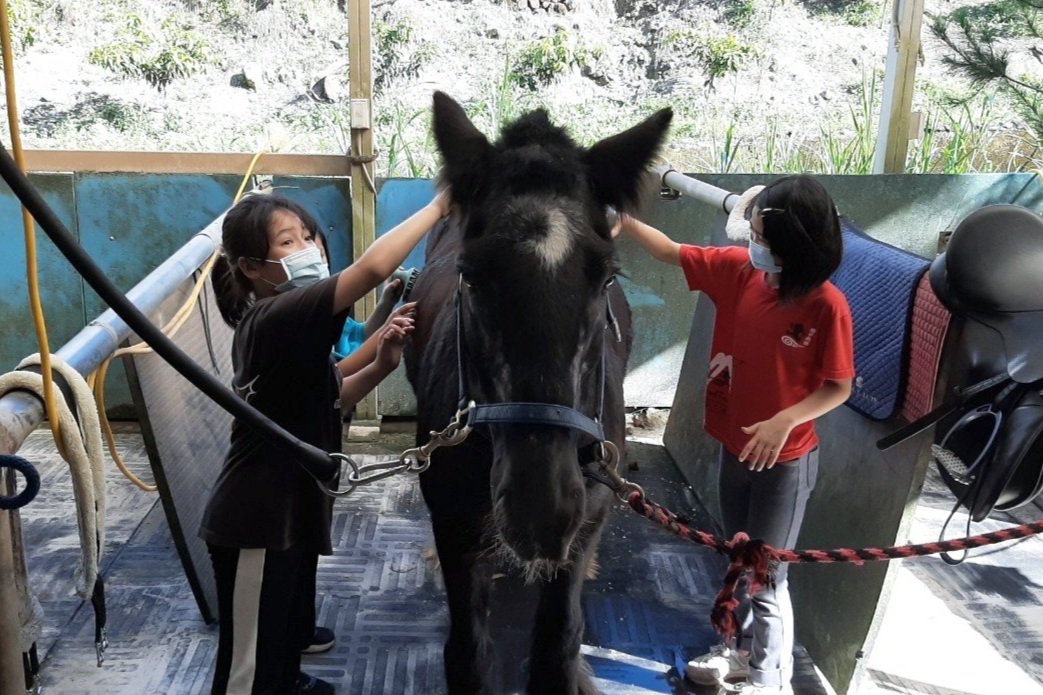The transformed mixed-age classroom for ages 6-9 is a relaxed environment, where children can freely focus on becoming the primary agents of their own learning.
Placing teachers in their most effective role
Though parents were supportive, Ms. Chang knew a bigger challenge lies ahead: teachers would need to receive Montessori teacher training or at least understand Montessori concepts. How to go about building a consensus amongst the teaching staff?
"First of all, read the books!" Having benefited from Montessori literature herself, the principal encouraged Zhong Keng teachers to read The Secret of Childhood. The faculty formed a reading club that helped provide a step-by-step guide into the world of Montessori.
However, reading in and of itself was not enough. During the 2021 winter break, Ms. Chang invited the teaching staff to Taipei Montessori International School (TMIS), where they observed a Montessori classroom for the first time.
The teachers were astonished: "Who knew the classroom space could be used like this!” one exclaimed. "So, this is how mixed-age education works!" said another.
Countless small shocks rippled through the faculty, generating a beautiful vision of an educational landscape that proved to be a powerful inspiration for Zhong Keng’s transformation into a Montessori school.
Ideally, all the teachers would undergo Montessori teacher training. In reality, however, some teachers want to wait and watch at the sideline; some want to learn by doing, while others devoted themselves wholeheartedly to the method. Giving teachers free rein to express their values proved to be a test of the principal’s wisdom.
Classroom reorganization was the school’s first priority. Zhong Keng followed their reviewed and approved experimental education plan. For the first two years, the school maintained mixed-age classes for the lower, middle, and upper grades, while preparing two Montessori classrooms for the 2022-2023 year (one classroom for ages 6-9 and another for ages 10-12).
Teachers were the next step. Professional teachers who had received Montessori teacher training serve as primary instructors; teachers learning on the job act as assistant teachers; and those who have received only basic training make up the administrative team, who support and assist classroom instruction.
Each of these three groups has its own strengths. Ms. Chang intends for assistant teachers to continue to learn and grow and one day become primary instructors. "In its Jena Plan, Zhong Keng had two different worlds in one classroom. This is no longer the case!" says Ms. Chang with a smile.
Today, teachers teaching in the same classroom have also changed how they interact thanks to the Montessori educational concept. They’re more willing to reflect on their actions and have become more conscientious toward each other.
Ms. Chang couldn’t be more pleased: "The atmosphere on campus has become even more harmonious!”
If the environment isn’t ready, keep making adjustments
The campus is near an equestrian school, making the "equine studies" class a unique feature of Zhong Keng's practical life education.
Montessori education emphasizes a "prepared environment.” That’s a tall order for Zhong Keng Elementary School, which is located in a remote area, has limited resources, and has experienced the devastation of the 921 Earthquake in 1999.
For example, when the school was rebuilt after the disaster, planners based the size of classrooms on small-sized rural schools. The resulting classrooms were comparatively small for Montessori teaching and could not be easily expanded. Other than redesignating the auditorium as an open classroom space, learning space expanded outdoors.
In the end, the original facility, which would be too crowded to house mixed-age students, was fully utilized - every available corner inside and outside the confines of the classroom are all part of the learning environment.
What’s more, there’s an equestrian school nearby. One of the “work” for these “cosmic children” is to learn about horse-related knowledge, such as horse health and diet, how to curry a horse’s coat, how to clean stables, precautions for riding and leading a horse, horse mathematics, and even the relationship between horses and human history and culture.
Teaching from the perspective of cosmic education expands children's learning and broadens their horizons. The "equine studies” class has unexpectedly become a unique feature of Zhong Keng’s life education.
For Accessible Montessori education to succeed, relying solely on the strength of the school itself is not enough. With the support of a dedicated group of parents and a teaching team unafraid of challenges and committed to continuous learning, Montessori can be implemented step by step, which in the case of Zhong Keng, has allowed Montessori education philosophy to take root.
"No environment can ever be fully prepared. There are always constant adjustments and adaptations.” Zhong Keng’s transformation has just begun, says Ms. Chang.
She hopes that after the process has been completed, Zhong Keng Elementary School will truly become "a school that "connects all things with love," where teachers and students will inwardly explore how to become warm and loving human beings!
Written by Yu-Hsiu Su
Images provided by Zhong Keng Elementary School
Translators: Robert Fox, Jen Hsu/Graduate Institute of Translation and Interpretation, NTNU





